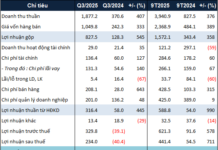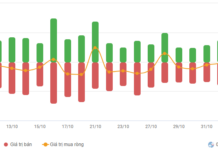
No longer active for lending to pay L/C but the lending process is only the disbursement of credit through the issuance of L/C (illustration photo)
The draft Circular outlines the viewpoint to build the Circular is to guide all activities related to the letter of credit business stipulated in the 2024 Law on Credit Institutions and international practices to ensure that credit institutions continue to provide full business and related services on the basis of compliance with the provisions on credit institutions in 2024 Law on Lending and the lending process.
Specifically, the L/C business is a form of credit grant, including 4 business operations: Issuance, Confirmation, Negotiation of payment, Refund) specified in Clause 4, Clause 36 of Article 4; Point e, Clause 3 of the draft.
Other business activities as specified by the Governor of the State Bank of Vietnam (stipulated in Article 114), including: (i) Other L/C-related services (point e, Clause 1, Article 114), including banking services serving sellers, exports; (ii) Other business activities (Clause 3, Article 114), is full outright purchase of documents under L/C (This activity has been allowed via letters of the State Bank of Vietnam sent to credit institutions, permitting them to conduct in accordance with international practices, it does not have the essence of a credit granting form but is a complete purchase of documents under L/C so it is necessary to include in the instruction as a business activity, not a payment negotiation activity in the Circular for the basis of implementation).
According to the draft, the implementation principles of the bank’s L/C business with customers are implemented according to an agreement between the bank and the customer, in line with the provisions of this Circular and the relevant provisions of the law on credit granting and international practices on L/C.
The verification of documents, the L/C payment process is carried out according to an agreement between the parties, in line with international practices on L/C.
The draft stipulates, the L/C business balance for customers, customers and related persons is determined on the date the bank issues, confirms, negotiates payment, refunds the L/C. Accordingly, to be consistent with other forms of credit granting, the reserve amount must not be excluded from the total credit limit when calculating the credit limit, the draft also does not allow the exclusion of the reserve amount from the credit granting balance because the balance is a measure of ensuring the credit granting activity through L/C business.
The draft stipulates that the bank and the customer agree on the applicable interest rate for the L/C business. For L/Cs issued to pay for goods, services in priority fields as stipulated in Clause 2, Article 13 of Circular 39/2016/TT-NHNN: Circular 39 stipulates the interest rate ceiling for short-term loans for 5 priority fields (serving agricultural development, rural areas as prescribed by the Government’s policy on credit in service of agricultural development, countryside; implementing the plan for export business; serving the business of small and medium enterprises; developing support industries). In the L/C issuance business, the bank will grant credit to businesses so in principle if customers belong to the 5 aforementioned priority areas, the interest rate ceiling for short-term loans according to the State Bank of Vietnam’s regulations will be applied.
However, in practice, the L/C business mainly serves customers for exporting and importing goods. If the draft Circular specifies the priority content of interest rates for these 5 priority areas, it may create disadvantages for Vietnamese businesses when being responded by governments of countries, trading partners to implement trade protection measures against Vietnamese goods exports under the reason of state-supported interest rates. Therefore, the draft Circular is not expected to specify the preferential content on interest rates for these 5 priority areas.
Regarding the currency issued by L/C, L/C payment, the draft stipulates the following principles, based on the purchase and sale of goods, services contracts, customers propose the issuance of L/Cs in any currency, the bank issuing L/Cs in that currency. For imported goods, banks are allowed to issue L/Cs in foreign currencies.
Regarding the currency of credit granting, credit granting to non-residents, the draft Circular specifies 3 cases, including:
First , for the issuance of L/Cs, if the customer does not fall into the category eligible for foreign currency loans under the prevailing regulations on foreign currency loans, the issuing bank is only allowed to grant credit in VND to the customer, even in cases where the L/C is issued in foreign currencies. By the date of L/C payment, the bank will disburse in VND to pay the L/C, the customer uses the disbursed amount from the bank to buy foreign currencies to pay the L/C.
In case the exchange rate at the time of L/C payment increases, leading to the VND amount the bank signs a credit contract with the customer is not sufficient to buy the required foreign currency to pay the L/C, the bank may disburse the full amount in VND to buy foreign currencies to pay the beneficiary party, but must ensure that it does not exceed the credit limit for customers, customers and related persons.
The bank only considers, decides to issue L/Cs for customers that are non-residents when the recipient is a resident to conform to the regulations in Clause 2, Article 131 of the 2024 Law on Credit Institutions: “Branches of foreign banks are provided with some foreign exchange services in the international market for customers in Vietnam as stipulated by the law on foreign exchange.”
Second , for the confirmation, refund of L/Cs, according to the draft, the bank’s confirmation, refund and the customer’s agreement on credit granting in Vietnamese dong or in the appropriate foreign currency with the currency of the L/C issuance. Branches of foreign banks are only allowed to consider, decide to confirm, refund L/Cs for customers that are non-residents when the beneficiary is a resident to conform to the regulations in Clause 2, Article 131 of the 2024 Law on Credit Institutions.
Third , for the L/C negotiation business, the bank is allowed to negotiate payment in the foreign currency specified on the L/C for customers who are allowed to receive and use foreign currencies in Vietnam according to the regulations on foreign exchange management or the customer uses the payment negotiation amount to perform payment transactions that the law stipulates that the transaction currency must be in foreign currency.
The bank only considers, decides to negotiate payment of documents under L/Cs for customers that are non-residents when the customer is a business established and operating abroad with capital contributed by Vietnamese enterprises under the form of direct investment abroad according to the regulations in the Investment Law to conform to the regulations in Clause 8 on foreign borrowing entities in Circular 45/2011/TT-NHNN stipulating foreign exchange management for foreign borrowing, repayment by credit institutions.
On the services related to L/Cs provided to customers, the draft is currently stipulating according to 2 options:
Option 1 , Banks provide customers with other L/C-related services as stipulated at point e, Clause 1, Article 114 of the 2024 Law on Credit Institutions in line with international practices on L/Cs.
Option 2 , Banks provide customers with other L/C-related services, including: Export L/C notification; notification of revision, verification, processing of export documents; Cancellation of L/C at the request; Transfer of Export L/Cs; Transfer of amended L/Cs; Transfer of L/C cancellations; SWIFT messages; delivery of document sets; presentation of documents according to the export L/C; Adjustment of payment demand letter at the request of customers; Preparation of documents according to the L/C for customers as requested by customers; Draft document verification, payment advisory, document processing; verification of errors in document transfers and other services in line with international practices on L/Cs.
On the complete outright purchase activity with no document demand, the draft Circular stipulates that only allows the full outright purchase of documents already accepted for payment to reduce the risk of documents being refused payment due to non-compliance with the L/C.
In the impact assessment, the draft Circular stipulating the overall L/C business shows that the issuance of the Circular aims to create a legal basis for L/C business activities and related services of credit institutions to be implemented uniformly, fully, clearly distinguishing between L/C business operations to manage this activity in accordance with the true nature of the business and ensure the L/C business of credit institutions is smooth, safe.
Based on the provisions of the 2024 Law on Credit Institutions, international practices on L/Cs, the relevant legal provisions, the draft Circular stipulates the issuance, confirmation, negotiation of payment, refund of L/Cs as a form of credit granting. Therefore, the operational procedure of credit institutions related to L/Cs must be changed, accordingly, no longer lending-to-payment L/C but the lending process is only the disbursement of credit through the issuance of L/C.
Thus, the issuance of credit through the issuance and payment of L/C is a unified credit granting process, banks must comply with the current credit granting regulations in the 2024 Law on Credit Institutions regarding credit granting conditions, implementation principles, credit granting agreements, dossiers, credit appraisal, disbursement, debt collection, interest rates, credit limits, overdue debt transfers, classification, provisioning level, risk provision methods… for credit institutions to implement uniformly.
Previously, at meetings on difficulties in VAT on L/C activities organized by the Vietnam Banks Association, credit institutions proposed the State Bank of Vietnam to have specific guidance when determining which business operation is credit, which business operation is a service in L/C activities.





































